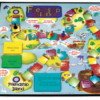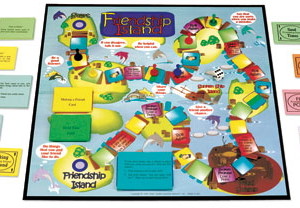A challenging and fun-to-play educational game designed to teach positive peer relations. The game focuses on three skill areas: making friends, being a good friend, and resolving disagreements in a win-win manner.
When playing the game, students learn to cooperate and help each other accumulate points. Two sets of game cards are included—one for grades 1-2 and one for grades 3-4. For 2-6 players. Can also be played by teams.
Educational games must be challenging and fun as well as a learning experience. In order to achieve all of these goals, Friendship Island® contains two different games. One game is designed for grades 1 and 2, and the second game is designed for grades 3 and 4. Both games use the same board, but the rules and cards for each game are completely separate. The game for older students involves more strategy, harder questions, more advanced vocabulary, and more opportunities for negotiation.
The principles of friendship emphasized in both versions of the game include sharing, being a good listener, taking into account the needs of a friend, the importance of talking out problems, etc., will continue to be valid into adulthood.
A Teachers Guide with complete lesson plans for both versions of the game is included. Students practice reading skills (reading the cards) and math skills (handling the point certificates). Students are challenged to use critical thinking in answering questions and in forming their strategies for playing the game. During the post-game discussion students link their experience in the game with real life.
Grades 1-4 (Also high interest material for older students and for kindergarten students when the teacher reads the cards).
Skills Addressed
Foundation Skills: Thinking Skills, Personal Qualities, Basic Skills
Workplace Competencies: Interpersonal Skills, Systems
Learning Objectives:
- Learn specific actions that they can take to make new friends.
- Learn specific actions that they can take to resolve differences with peers.
- Learn how to treat friends with respect.
- Learn the responsibilities of friendship.
- Learn prosocial behaviors, such as: sharing, taking turns, being a good listener, talking out problems, avoiding “bossy” behavior, and taking the needs of others into consideration.



